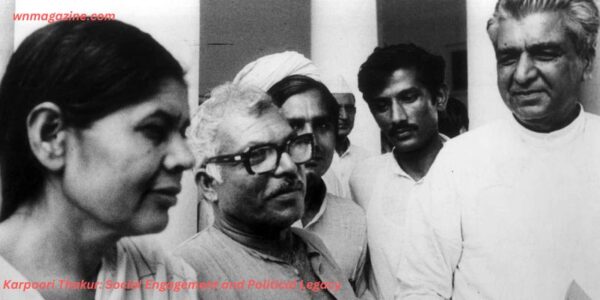Karpoori Thakur: Social Engagement and Political Legacy
2 min read
Karpoori Thakur: Social Engagement and Political Legacy

Karpoori Thakur: Social Engagement and Political Legacy
Karpoori Thakur, a prominent socialist leader and former Chief Minister of Bihar, is set to be posthumously honored with India’s highest civilian award, the Bharat Ratna, as announced by the government on Tuesday. Thakur gained recognition for his tireless advocacy for the welfare of the lower classes during his tenure as Bihar’s Chief Minister.
Also Read: well health tips in hindi wellhealth
Born and raised in the small village of Pitaunjhia, now known as “Karpuri Gram” in Bihar’s Samastipur District, Thakur had a patriotic upbringing. As a student, he passionately embraced Indian nationalism and joined the All India Students’ Federation (AISF), the oldest student organization in the country.
In response to Mahatma Gandhi’s call for the British colonial government to leave India during the Quit India Movement in 1942, Thakur, driven by a strong sense of patriotism, abandoned his graduate studies to join the movement. His commitment led to a 26-month imprisonment as the British government suppressed members of the Indian National Movement.
The Political Career of Karpoori Thakur Following Independence
Karpoori Thakur re-entered politics after India gained independence in 1947. Elected to the state legislature in 1952 from the Tajpur constituency in Bihar with the support of the Socialist Party, he rose to political prominence for his unwavering advocacy of workers’ rights, marked by numerous strikes and arrests. In 1970, he led a 28-day fast in support of the rights of telecommunications workers.
Before becoming Bihar’s first non-Congress socialist Chief Minister, Thakur served as the state’s Education Minister. He staunchly advocated for Hindi as the official language of instruction, making it illegal to possess or use alcohol during his tenure as Chief Minister.
Karpoori Thakur, a close associate of Jay Prakash Narayan, played a pivotal role during the emergency phase (1975–77) in laying the groundwork for the ‘Sampoorna Kranti’ (Total Revolution) movement, aimed at peacefully transforming Indian society.
During the Janata Party split in 1979, Thakur aligned himself with Charan Singh. He was re-elected to the Bihar Assembly in 1980 and 1985. Thakur passed away on February 17, 1988, after a lifetime of advocating for social and political justice.
Beyond his official duties, Thakur made a significant impact by championing the empowerment of the Other Backward Classes (OBC). His efforts were instrumental in setting the stage for the Mandal Commission’s recommendation to reserve seats for OBCs in the 1990s.
Also Read: wellhealthorganic vitamin b12
In 1977, while Thakur was Chief Minister, the Mungeri Lal Commission proposed reclassifying Muslims and economically disadvantaged individuals into two separate categories: very backward and backward. The implementation of this report in 1978 marked a watershed moment, addressing the concerns of the most marginalized citizens under Thakur’s leadership.